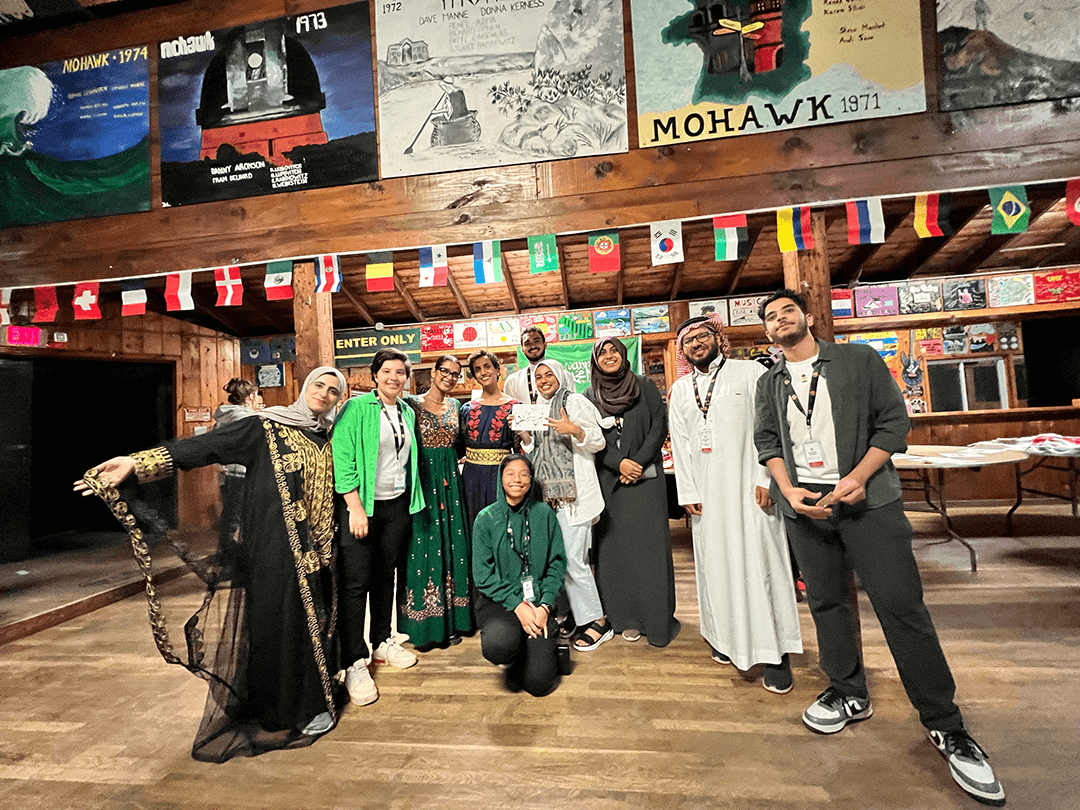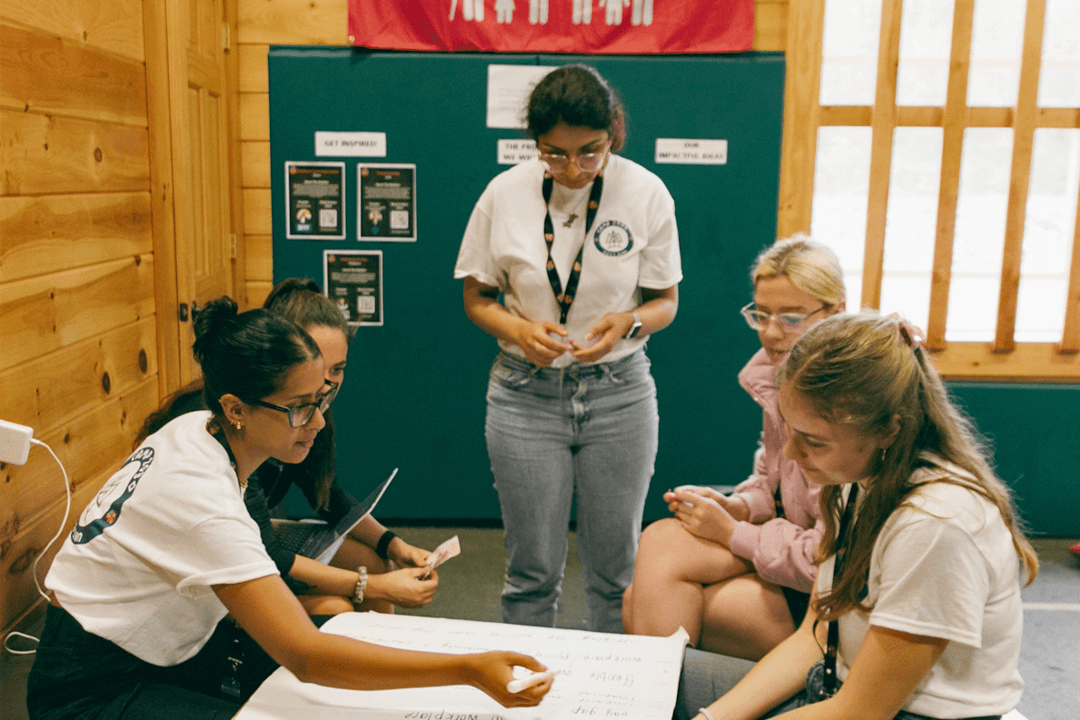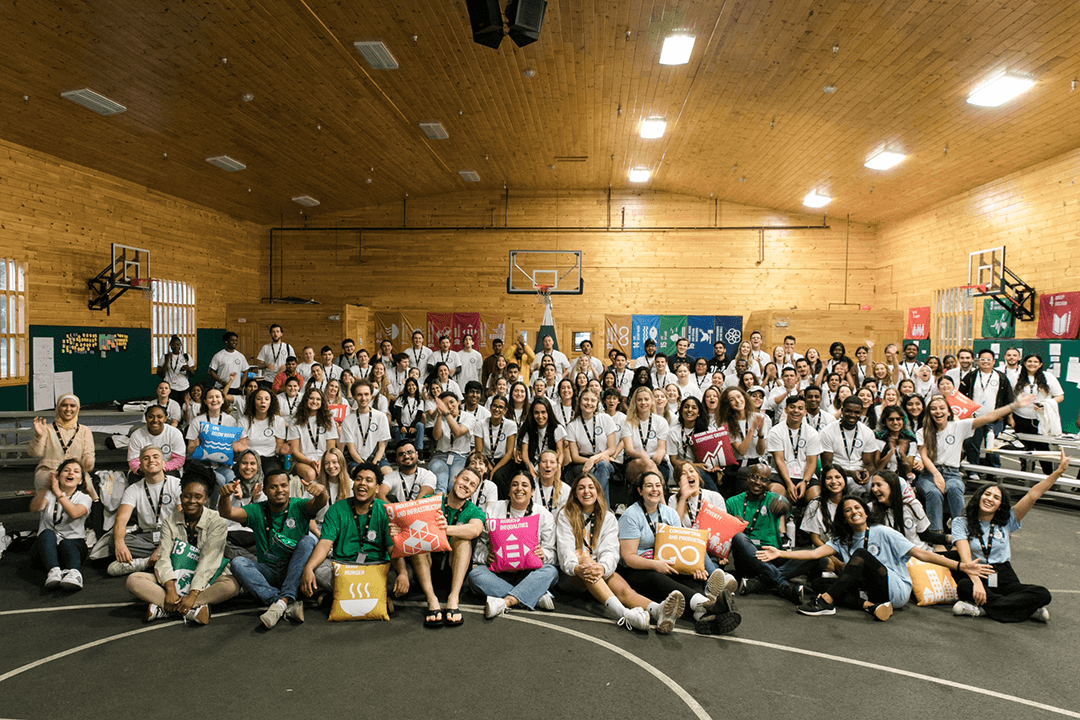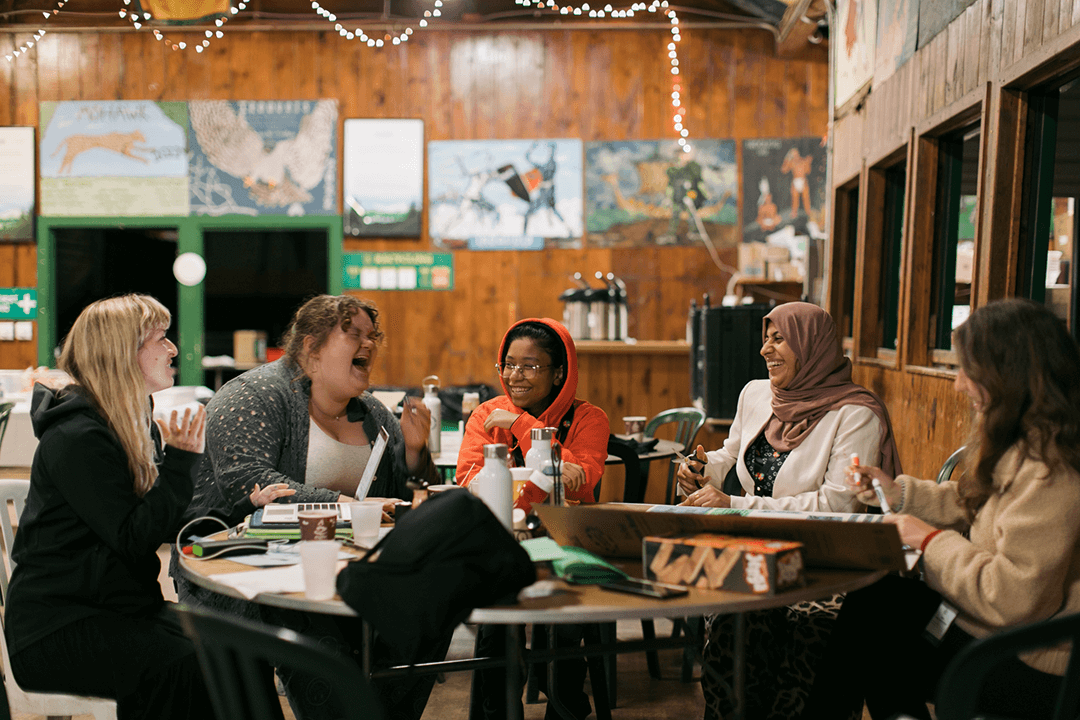KAUST students spark change at Camp 2030 with innovative SDG solutions

Eight KAUST students were selected to attend Camp 2030, a global innovation lab for the UN Sustainable Development Goals. Five of the KAUST students are shown here with other students from Saudi Arabia: Rund Tawfiq (second from left), Sarah AlHarbi (third from left), Afnan AlBatati (fourth from left), Eman Alhajii (third from right) and Omar Abed (second from right). KAUST students not shown: Indah Putri, Natalia Odnoletkova and Michael Oyinloye. Photo: KAUST
In September 2022, a group of KAUST students traveled to the United States to take part in an inaugural, next-generation summit to inspire solutions to some of the most critical global issues.
Set in and around the State of New York, Camp 2030 is a six-day innovation lab by Unite 2030, geared around the United Nations' Sustainable Development Goals (SDGs), hosted during Global Goals Week 2022.
Eight students from KAUST were selected from approximately 200 "of the world's top young changemakers" to participate at the event – Sarah AlHarbi, Afnan AlBatati, Rund Tawfiq, Indah Putri, Omar Abed, Natalia Odnoletkova, Michael Oyinloye, and Eman AlHajji.
AlHarbi, a graduate student at KAUST pursuing a PhD degree in bioscience, also serves as the vice president of Women in Science and Engineering Research (WISER) at KAUST, a student group focused on promoting gender equity and supporting female students in the most varied challenges they can encounter in academia.
Reflecting on the Camp 2030 experience, she commented: "I now feel even more motivated to make a difference in Saudi Arabia, and the Camp was a unique opportunity to learn how to go about making change. Many of the young people there were already making things happen, some even already running their own NGOs."

Sarah AlHarbi, left, a KAUST doctoral student studying bioscience, meets with her team at Camp 2030. AlHarbi is also the vice president of WISER — Women in Science and Engineering Research. Photo: KAUST
AlBatati, a KAUST doctoral student of materials science and engineering whose current work focuses on green energy, also emerged inspired from the experience.
"This was an amazing networking event where more than 200 people from 61 countries and multiple disciplines, not just science, were thrown in the deep end," she said. "Like Sarah, I felt we came away with the confidence and connections to ensure we can make a difference and provide answers to some key challenges."
The participants, ranging between 18 and 30 years of age, were based in a secluded corner of Upstate New York at Adirondack Park. There, across the next four days, they engaged in what was dubbed an "un-conference" experience of hands-on solutions development and authentic relationship building.
The students were tasked with working in teams of five to develop innovative solutions to the world's biggest challenges in the form of the UN SDGs, covering critical themes such as poverty, health and wellbeing, education, gender equality, clean water and sanitation, and climate action.
Al-Harbi and AlBatati both focused on SDG 5, concentrating on the issue of gender equality and devising ways to address specific challenges.
AlBatati's team considered how to help break the intergenerational cycle of domestic violence, framing their solution around a series of online learning resources for children to encourage and develop critical thinking capabilities.
"Children growing up in these environments tend to end up in abusive relationships themselves, so we were trying to tackle that at the level of the child by creating modules that can be taught in classrooms and are accessible to anyone to download and teach," Al-Batati explained.
"The idea is to teach children good problem-solving skills that can help them to tackle interpersonal issues in a conductive and safe way."
On day six, the campers returned to New York City to attend the first day of the UN's Global Goals Week, pitching their solutions to a judging panel before concluding the Camp with a closing ceremony.
"The relationships we have built in just a few days will extend well beyond the week in New York," AlHarbi added. "We were thrown well outside of our comfort zones, rooming and living with people we had never met before in cabins in the wilderness.
"But it is this ability to bond, collaborate and think outside of the box that holds the key to solving the world's challenges. What reassured me was that I am not alone in working for greater gender equality. We realized we are not lonely – we all arrived with different backgrounds but came together because we care about the same things."

Eight KAUST students were among the approximately 200 next-generation leaders selected to attend Camp 2030, a global innovation lab for the United Nations sustainability goals, hosted by Unite 2030 in New York, September 2022. Photo: KAUST
Across the week, all eight students represented KAUST with pride, armed with a passion to pioneer the next game-changing sustainable ideas. As well as SDG 5, KAUST students focused on other critical challenges throughout the week, including good health and wellbeing (SDG 3) and decent work and economic growth (SDG 8).
The Camp has provided younger generations an important platform to showcase their ingenuity and forge relationships that could prove fruitful in the decades to come, as over time it is this cohort of students that will become responsible for delivering on sustainable manifestos and progressing the SDGs.
This is why the KAUST nominating committee did not hesitate to nominate some of the university's brightest minds to make the journey. The committee is composed of individuals representing Alumni Affairs, Student Career Development and Strategic National Advancement (SNA), a division at KAUST committed to developing the Kingdom's most talented youth through STEM scholarship, sponsorship, programs and initiatives, including the KAUST Gifted Student Program (KGSP).

Eman Alhajji, second from right, meets with her team at Camp 2030. Alhajji, a KAUST PhD student of materials science and engineering, is also the founder of Students for Sustainability, and a former recipient of the KAUST Gifted Student Program (KGSP) award. Photo: KAUST
Sandra Katakalea, Student Career Development lead at KAUST, commented: "We encourage students to participate in leadership opportunities aimed at broadening their arena of skills in addition to their academic curriculum. The Camp seeks to spark entrepreneurial solutions to the SDGs, which are aligned to KAUST values of curiosity, innovation and citizenship, and to the efforts of KAUST Sustainability."
Sending strong student representatives to events such as Camp 2030 aligns with the KAUST Sustainability vision to be a global model for resource circularity, and to nurture the people and the solutions that will help sustain our planet.

